Baritone Thomas Hampson
A Conversation with Bruce Duffie
It is always informative to look back on a great career and see “whence
it sprang.” Thomas Hampson is certainly a well-regarded
artist in his chosen field, and that field is quite expansive. It contains
opera, song literature and orchestral concerts, as well as lighter fare.
He is here, he is established, his reputation is secure and his recorded
legacy is large.
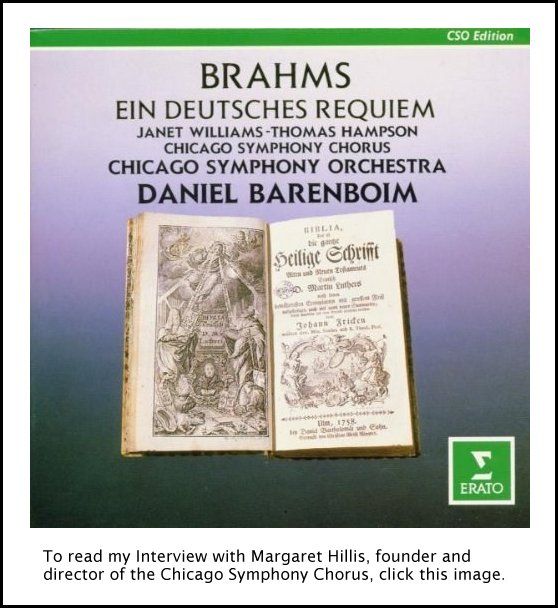 This conversation took place in Chicago in September of 1992, when he
was in town to open the season of the Chicago Symphony with performances
and recording of the Deutsches Requiem
of Brahms. He was already on his way to becoming an artist of the first
rank, but so many triumphs still lay ahead. Now, as this is being posted
to my website in 2016, we know the full extent of his achievements, and can
still look forward to still more as his career moves along.
This conversation took place in Chicago in September of 1992, when he
was in town to open the season of the Chicago Symphony with performances
and recording of the Deutsches Requiem
of Brahms. He was already on his way to becoming an artist of the first
rank, but so many triumphs still lay ahead. Now, as this is being posted
to my website in 2016, we know the full extent of his achievements, and can
still look forward to still more as his career moves along.
Even at such a youthful age, he spoke with assurance and candor, and a firm
knowledge of his own place in the ongoing history of music. Remaining
his charming self throughout, we managed to discuss some ‘heavy’
topics.
After a rehearsal, we met in the music library office downstairs at Orchestra
Hall, and while settling in for the conversation we were chatting about having
so much material to learn . . . . . . . . .
Bruce Duffie: Is
there any time at all when you stop learning about music?
Thomas Hampson:
Oh, I hope not. I hope not, no. Learning is a natural process
of life. It’s fascinating. It’s one of the reasons why musicians
live such energetic lives. We all have our problems and so forth, but
a musician, an artist, is essentially always curious. That’s the biggest
part of being an artist — being curious about why things
were written; in psychological terms, why it exists, why we exist, why we
even want to learn. Why are we curious? Why do we want to make
music? It’s always the “why,” more than the “how,” that I think is
fascinating.
BD: You’re at the
point of your career where some roles are repeated, and quite a bit of material
is new. Do you find it more exciting now to learn new material?
TH: I don’t feel
like I’ve ever not learned new material, but that’s probably because of my
curiosity. I’m rather restless about old material. There are
some things that I certainly like to keep performing, and some songs that
I think are just wonderful. I love recreating those moments again and
again as I get older, as different aspects impact my prism of me. What’s
coming through me is perhaps different, but that’s a selfish way to look
at it. It doesn’t have much to do with me, really. But learning
new things is just somehow part of the process. It doesn’t get any
easier, I can tell you that! [Laughs]
BD: When you come
back to a role that you’ve sung, can you learn it again as a new piece?
TH: I try to.
It depends on the circumstance a lot. If it’s really sat for a while
and I haven’t been at it, then I really do try. In fact, in some extreme
cases I even bought a new score and just started all over, especially if
it’s something I learned very, very early on. I find I’ve done that
more with song material than I have with opera material because of the worth
of the editions. For one thing, I couldn’t afford finer editions, perhaps
the cleaner editions, and also when I was learning a lot of songs and going
through the repertoire, some of the editions simply weren’t available.
The research hadn’t been done. But I do try to relearn things fresh.
On the other hand, it’s also nice to already have that bedrock there so you
can go on farther. You can perhaps develop more of the subtext around
it.
BD: As things are
familiar, then you plumb greater depths in each one?
TH: That seems
to be an automatic answer, but it seems to me that if you say that, then
it precludes the idea that you’ve plumbed greater depths the first time you
looked at it, and I don’t think that’s true. Perhaps the depth may
remain the same, but you may be more aware of the depth than you were the
first time. You’re always aware of something else. I’m sure if
you asked Barenboim how he felt about looking at the Deutsches Requiem again, he would say,
“I found...” Great people always find something new. Again, that’s
the great passion of curiosity with musicians. [See my Interviews with Daniel
Barenboim.]
BD: So it doesn’t
mean that it necessarily wasn’t there the first time?
TH: Exactly.
BD: You’re just
bringing it out and highlighting it?
TH: It might actually
be something that you knew the first time and you brought it out the first
time, but you bring it out differently or you see it differently. Sometimes
the color red is extremely vivid. It’s like the changing of a landscape.
Sometimes the light is just different. It’s wonderful.
BD: Without mentioning
specific names, are there, perhaps, some pieces that you feel you’ve gotten
everything you can get out of, and you’re not going to come back to them?
TH: I’ve been criticized
about that, because I do think that it is possible to say, “We know that
piece. We know what it’s about. We know why it was written.
We know the ins and outs, and whys and wherefores.” Then the challenge
becomes to keep your hands off of it and just do it and let it breathe, which
seems simplistic, because that should be the final approach of all of music-making.
Even ‘music-making’ is sort of
a funny term if you think about it. I don’t really believe in ‘making’,
but it’s sort of re-making, re-giving, exploring existing ideas. It
always has to be a spontaneous gesture, the prevalent awareness of the forest
and never the preoccupation with the trees. A very good case in point
is working on this piece again. How often have I sung the Deutsches Requiem? Daniel and I
were going through it, and the phrases were working fine. It was all
fine. It’s intense, and I know what it’s for and he knows what it’s
for. Then he said to me, “Find the word in the phrase that you want
to underline, and leave the other ones less un-underlined. You can’t
underline everything because then nothing’s underlined.” What he said
just stopped me, and he’s absolutely right. It was a small thing to
fix. As musicians, when looking at pieces again and again we can start
thinking, “Last time I underlined A, B, C, and F, so this time I’ll got back
and get A, B, C, F, and E.” Then you’re left alone.
BD:
Will this change from performance to performance, or perhaps from production
to production?
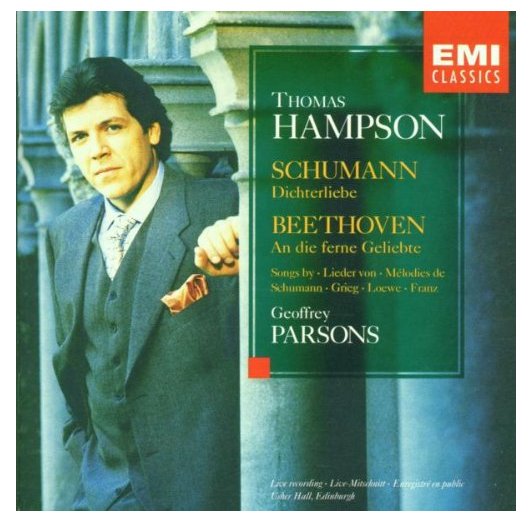 TH:
Probably more production to production, although each performance has its
own life. I think it should, anyway. It’s not just a matter of
learning the format for this set of performances. I would like to believe
that it is always the struggle, or the passion, a liberation to spontaneity,
maybe. I hate the idea of doing something in music in terms of manipulating
it, or thinking I’m going to do this piece this way, getting my hands on
it, rolling my sleeves up on it. There is a place in the preparation
of the work that’s like that in the detailed sensitivity with which an artist
has to look at music. I believe in that, and in fact I love that process,
but it seems to me in the re-giving, in the — I don’t particularly like the
word ‘performance’ but there’s
no other word — it seems to me that you have to get rid of ideas of ‘doing’
and ‘making’, and it has to be
more a point of being and existing. That’s essentially what a composer
was trying to do. He wasn’t trying to make a musical piece as much
as he was trying to create a synthesis of different thoughts and ideas in
a musical moment, which then could re-live and re-live and re-live.
TH:
Probably more production to production, although each performance has its
own life. I think it should, anyway. It’s not just a matter of
learning the format for this set of performances. I would like to believe
that it is always the struggle, or the passion, a liberation to spontaneity,
maybe. I hate the idea of doing something in music in terms of manipulating
it, or thinking I’m going to do this piece this way, getting my hands on
it, rolling my sleeves up on it. There is a place in the preparation
of the work that’s like that in the detailed sensitivity with which an artist
has to look at music. I believe in that, and in fact I love that process,
but it seems to me in the re-giving, in the — I don’t particularly like the
word ‘performance’ but there’s
no other word — it seems to me that you have to get rid of ideas of ‘doing’
and ‘making’, and it has to be
more a point of being and existing. That’s essentially what a composer
was trying to do. He wasn’t trying to make a musical piece as much
as he was trying to create a synthesis of different thoughts and ideas in
a musical moment, which then could re-live and re-live and re-live.
BD: At what point
in this whole process comes the sharing with the audience?
TH: The idea of
sharing with the audience is oftentimes too articulated, as it’s something
we are handing to the audience from the stage in practically every genre,
whether it’s Lieder or opera or
concerts. I prefer to think of the state of being of singing, where
it closes a chain to the audience. In other words it becomes a circular
giving and re-giving. The audience is not really so important about
what I believe, for instance, Dichterliebe
to mean. What is important is recreating Dichterliebe in an environment, in a
circumstance, in a state of being that the audience can understand.
They can decide for themselves what Dichterliebe
is. I don’t believe much in handing people interpretations. I
don’t particularly like the idea of interpretation.
BD: Do you feed
off the audience every night?
TH: Oh, I think
so. Yes, absolutely. One of the psychological dimensions of late
20th century music-making that needs to be more discussed is the audience
participation, just simply spiritually. If you go into a movie theater,
you’re drawn into something that’s rather dark, and you’re observing something
go by. But you can’t use that kind of passive awareness in a live concert
situation. Maybe that’s one of the reasons why orchestral music seems
to be predominantly more popular than vocal music is in terms of concert-going.
Vocal music then becomes popular because of the spectacle involved, and for
me, that’s the more irrelevant part of singing.
BD: Is the spectacle
irrelevant even if it draws them in?
TH: Singing as
a circus of high, loud notes and famous personalities and TV people that
you’ve seen or records that you’ve seen in racks is irrelevant. That
is not why music exists. We are the servants of music, and not the
other way around. I feel very strongly about that. I think we’ve
gotten kind of off the track, sometimes.
BD: Let me get
you to answer your own question. Why does music exist?
TH: Why do we exist?
Music is part of existence. I don’t think it’s an intangible third-person
experience that we accumulate as human beings. It is a natural instinct
to communicate, therefore it falls under that line into communication.
It is also a natural instinct of human beings to reflect and to ponder the
why of their existence. That is essentially what separates us from
animals — being able to even contemplate that
— and as long as we are able to do that, or want to do that, then
obviously music is very much a part of that.
BD: So we should
not try to equate our music with the music of the dolphins or the whales,
or any other living things?
TH: A dolphin cannot
contemplate its existence, and I see music as a part of the natural tendencies
of human beings to be awake. We have a musical thought, whether we
are making music or re-hearing music or whistling or speaking or hearing
musical sounds. Music is something very basic, and in the same way
it can become into some animals — like the music of
dolphins, which I find fascinating, or the music of whales or other natural
animal sounds. We are part of the animal kingdom, and that’s one of
the common denominators to the animal kingdom that I think is fascinating.
But humans are able to reflect on that. “I am going to make music now,
versus doing something else.” We also are cognizant of why we are doing
this, which is more peculiar to the Homo Sapiens than it is to the dolphin
or the cow. [Both chuckle] This is pretty heavy weather for a
Chicago afternoon! [Both laugh again]
* *
* * *
BD: You sing opera
and orchestral concerts and Liederabend.
How do you divide your career between those three very different activities?
TH: Very carefully!
[Laughs]
BD: I’m making
assumptions. Are they very different for you?
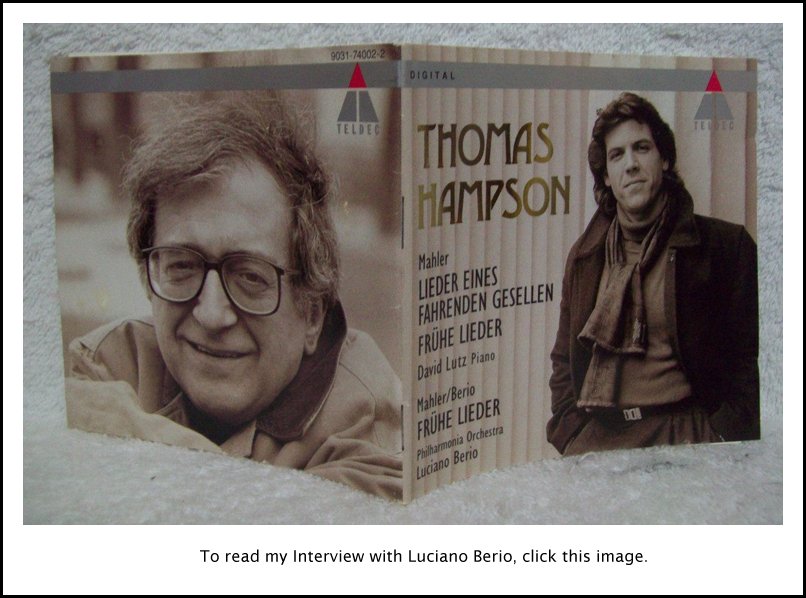
TH: Not really.
The intent is different. I do not subscribe to the modern day thought
that there are opera singers, and Lieder
singers, and concert singers. If it’s not ridiculous, it’s certainly
a perversion of what basic singing is all about. It didn’t used to
be like that. My great idols in life included Lotte Lehmann, Heinrich
Schlusnus, Gerhard Huesch and others. It wasn’t always differentiated.
One sings different kinds of music with a different intent, and whether one
can have the flexibility of understanding different psychologies, and therefore
different intents of music making, that’s individual to each artist.
But to make it into some sort of marketing category, or even operatic category,
or just a basic description, I find somehow limiting to the singing soul.
It doesn’t make any sense to me. I don’t mean to get so metaphysical
all the time, but it irritates me on a very basic level. I just don’t
agree with it. I think it’s nonsense. If opera singers would
sing more songs — and inevitably, if you talk to anybody who does
— they would find a richer experience in exploring the opera repertoire,
and vice versa. The Lieder
repertoire should not be necessarily diminutive of the grand operatic experience.
It’s a different formula. Again, it has a different intent, a different
forum, but it’s still the landscape of the human condition.
BD: Can Lieder evenings ever make a real comeback,
a solid comeback?
TH: On one level
they don’t have to make a comeback. They may not be as prevalent, but
the evenings that are there are doing just fine. We’re really walking
on thin ice here, but for the solo performance, the Lieder evenings, the song evenings the
artists themselves need to be more imaginative in terms of repertoire.
The critical establishment needs to be more aware of what the singing history
is all about, both in terms of the physical production of singing, as well
as the intent of narrating and singing songs to people. That’s very
often criticized. I’ve tried very hard to stay within the norm of repertoire,
but at the same time expand the edges a bit. Not even expand the edges...
that sounds too self-aggrandizing. What I mean is just simply singing
things that haven’t been sung for a while because I think they’re very good.
And for the most part it seems to be accepted, although you do hear the odd
comment, “With his abilities, why does he mess around with this sort of peripheral
stuff? Where’s his Winterreise?
Where’s his Schöne Müllerin?”
Well, it’s coming. That’ll be fine, but there’s more to life than that.
Besides that, it seems to be as soon as I do that, it’ll be, “Okay,
that was great, and that was Hampson’s,” and I might
even stay on a couple of charts for three or four, five, six, seven weeks.
Then they will say, “Well, who’s behind him? Who’s also doing it?
Why don’t we have him do it, or her do it, or this do it, or that do it?”
As long as that seems to be the atmosphere of celebrity and consumption,
then it’ll always be a problem as to how to motivate people to come into
an auditorium and reflect on different aspects of the human soul through
music.
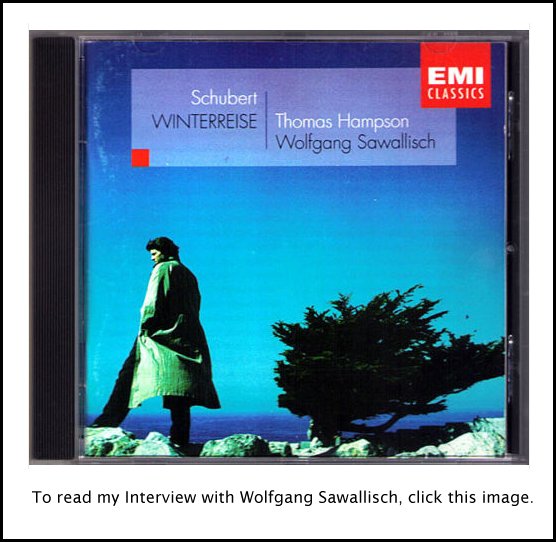 BD:
That’s the word — ‘consumption’!
BD:
That’s the word — ‘consumption’!
TH: It is consumptive.
It is! But you hear the same arguments from the visual arts and from
people writing books.
BD: Perhaps it
is because you started in the big Mozart roles and a few of the other large
things that they expect you to do the same thing with the Lieder — Winterreise and Schöne Müllerin —
rather than the smaller songs. If you had started with smaller
roles or secondary roles or odd roles, perhaps they would have a different
expectation.
TH: Maybe so; I
don’t know. For me, Winterreise
is bigger than any role I have yet to date sung. For me, Winterreise has such enormous consequences
of life that I haven’t felt prepared to really grapple it.
BD: And of course,
75 minutes of straight singing is nothing to be sniffed at!
TH: Well, exactly.
The physical demand is keen, but that’s less my concern. If your psychological
demand is in line, it transcends the physical necessity of any repertoire.
That’s why a lot of people feel so completely exhausted after a performance,
and they’re not necessarily aware of it during the performance. You’re
being drawn by something quite clearly not physical.
BD: In songs or
operatic roles or concert literature, how do you decide which you will sing
and which you will put off until later, and which you will not ever sing?
TH: That’s a very
difficult process. Sometimes it presents itself just because of the
environment — what you’re being asked to sing, for
one thing.
BD: But you may
say yes or no?
TH: That is correct,
but for me, the point of departure for operatic repertoire is whether I can
understand the character more than whether I can physically sing the role.
Then, I must say, I am very aware of what circumstances that particular opera
performance or production is going to be created — who
is producing, under what intent, and who is conducting also under what intent.
In the world of opera today, there is a tremendous demand for the vocal, physical,
and image side of a singer to somehow be in accordance with itself.
I’m a young man, so I read very young from the stage. With all the
good will in the world, and all the makeup and beards, there’s only so far
you’re going to stretch that dimension, regardless of my understanding of
the role and regardless of my physical ability and physical sound to do the
role. You have to respect that limitation even though it’s dictated
far out of proportion today than it should be. We could have some very
interesting vocal experiments, to have people with the right intent sing
more lyrically and examine some of this repertoire that’s been screamed at
us for the last fifteen to thirty-five years. I’m really tired of being
yelled at by people... and I’m guilty of it as well! The whole decibel
environment of opera has reached its limit. Each work needs to come
back and be treated for why the piece was written in the first place
— which is always the point of departure — from
the historical and literary perspective.
BD: Of course part
of that is the result of the concert halls. Works were written for
smaller halls, and now we’re in big barns.
TH: America has
its own problems in its tradition, certainly. We have big, big houses
here.
BD: Do you adjust
your voice technically for the size of the house?
TH: You have to,
but the size of the house is sometimes irrelevant if the acoustic is correct.
Most houses want to be sung to and not yelled at, anyway. More to the
point is the ensemble environment between you and the orchestra and the conductor
in any given house, which it’s going to be understood not just heard.
We can hear and see things without necessarily making changes, and it becomes
a property of observation more than a property of participation. Opera,
for me, is a participatory art form. To sit in an enormous house and
hear somebody singing, you might even hear the words but you’re not actually
participating in that thought process of that character — which
is why the music was written in the first place. All of that seems
to be a negation of the art form. We need to back up and have a look
at that. I really feel very strongly about that, therefore all of these
considerations go along... whether I’m looking at an Onegin this year, or whether it should
have been three years ago, or a Posa for the first time this year versus
probably being able to sing it somewhere else three or four or five years
ago. Who knows, but you have to time all of those things. The
sorting out of my repertoire has more to do with just simply physically how
much time I have to study and prepare, and balancing all my different interests.
I’m consumed in my passion for music, and I have a lot of different musical
interests.
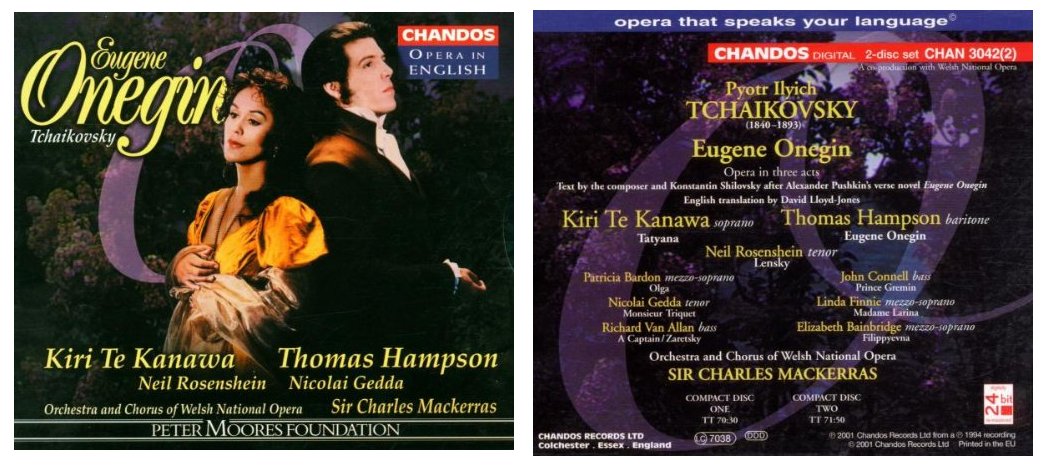
BD: Do you make
sure you have enough open dates to just rest the voice?
TH: That is probably
the biggest criticism that can be leveled against me. If I confess
to being a workaholic, that sounds almost sort of neat, and I need to be
honest about that. I probably sing too much and I probably work too
much. It’s not easy for me to structure that differently, but I do
need to do that. Most of the publics who know me have a hard time understanding
when I say that because they only see me sporadically in any given country
or place. There’s no one place that I’m ever at, and that’s part of
the problem. I probably need to be more focused about that.
BD: Do you like
being a wandering minstrel?
TH: There’s just
so many different things that interest me. I couldn’t possibly not
sing in Germany, or Italy, or Austria, certainly, as well as not sing in
America. There’s different places in America; there’s a lot of places
I would like to sing in America that I haven’t been to — different
towns and different areas. I’ve been through most of America, both
as a kid and now as a working professional. The traveling gets very
tiresome. I’m a good, solid ten and half months of the year on the
road, and that’s not saying that the month and a half is at home. It’s
two days here and four days there. I’m young so I’m holding up, but
in some ways it’s a bit like the performance of a very strenuous role.
I’m so motivated by my real love of music and singing and different kinds
of music, that oftentimes I am not aware of the fact that I haven’t actually
been home for four months. The only reason I really know that is because
I haven’t been in my library. But you have to find the compromises.
You have to get control of it. I’m trying to get more focused.
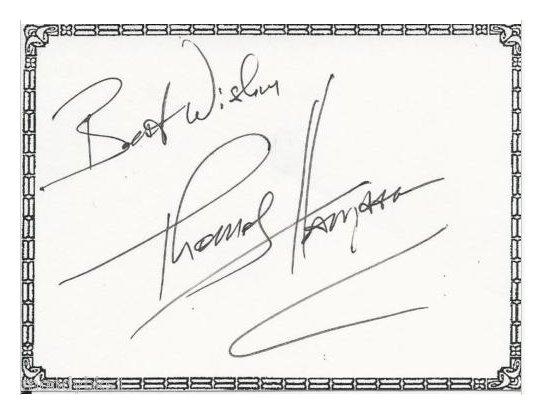 BD: Despite all of that, is singing fun?
BD: Despite all of that, is singing fun?
TH: Yes, it is.
Singing is physically a lot of work, but the fun... ‘fun’
is a funny word because fun for me is something that is fulfilling and rewarding,
like playing a really good game of golf or having a great game of tennis,
or feeling like you’re starting to understand a piece of music, or perhaps
even catching on to a clever moment that the composer stuck in there as his
own little joke on you. Or fun can be simply discovering a poem or
a piece of music that somehow ignites a spiritual and harmonic response in
you as a human being. Those things are fun for me. Fun is somehow
always put together with the notion of hobby, and I don’t think artists have
hobbies; their life is a hobby. Everything has to do with the re-giving,
the recreation of music; this means everything physically, entertainment-wise,
the books you collect, what you read, everything. Everything has to
do with it because being an artist is one of the highest callings as a human
being.
BD: It sounds like
you really are focused.
TH: On that I am
focused. I think so... I would hope so. I try to be. [Laughs]
BD: Are you coming
back to Chicago?
TH: Oh, I hope
so, many, many times. Yes, I’m coming back in the winter of ’95 for
The Barber of Seville at Lyric,
and I’m quite sure that Barenboim and I will be working in different mediums
here together. I really like what Barenboim’s doing with this piece...
and talk about the evolution of an artist, he’s the perfect example.
When he started conducting, everybody was saying, “Danny, what are you doing???
Just play the piano and leave us alone!” I think he’s turning into
one of the really great conductors.
BD: We’ve had him
as a guest conductor for over twenty years, and he has done well and made
records for a long time.
TH: Yes, exactly.
You took a risk on him a long time ago. He’s one of the few people
today that I would really truly call genius. I do believe that he is
genius. He’s one of the few truly composite musicians. There’s
very little about the structure of music, the re-giving of music in different
mediums that he doesn’t know. In fact, I don’t know any facet that
he doesn’t understand. I’m surprised he doesn’t actually compose.
Maybe he does...
BD: He probably
has no time for it!
TH: Exactly.
He’s so busy. But I think he’s really wonderful. We’re going
to be doing something good together. We start this fall doing Schwanengesang in Berlin. We were
talking last night, and we definitely would like to do a recital here in
Chicago. So I’m sure that we will, but again, his time is so limited.
BD: [With a helpful
nudge] Book him ten years in advance and hope that he can keep the
date.
TH: Yes!
[Laughs]
BD:
Another time when you come back we’ll talk about roles and recordings and
things like that.
TH: Great!
Love to.
BD: Thank you so
much.
TH: It’s been a
pleasure.
A few more of the many recordings by Thomas Hampson,
selected
for their inclusion of some of my
other interview guests.
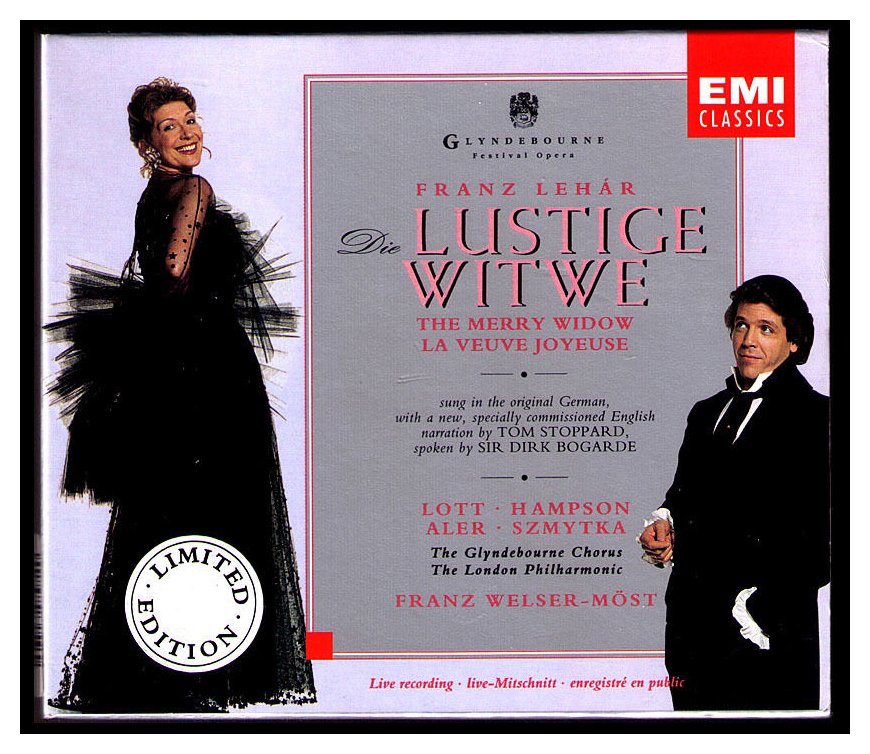 See my Interviews with Felicity Lott and John Aler.
See my Interviews with Felicity Lott and John Aler.
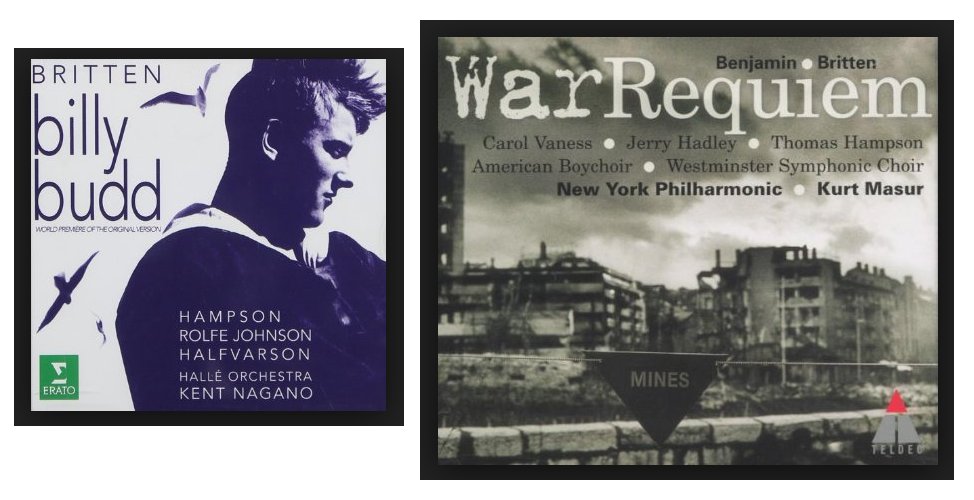
See my Interviews with Anthony Rolfe Johnson,
Erik Halfvarson, Carol Vaness, Jerrry Hadley, and Kurt Masur.
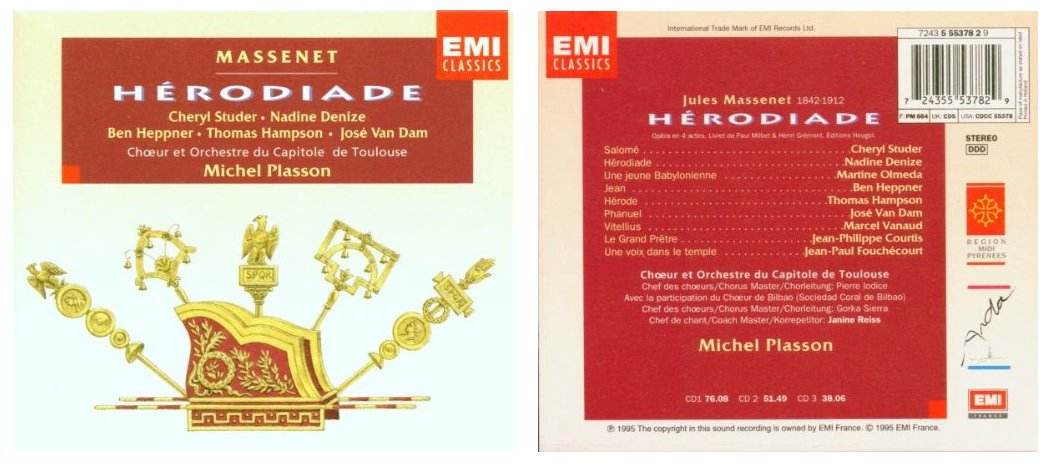
See my Interviews with Nadine
Denize, José van
Dam, Janine Reiss,
and Michel Plasson.
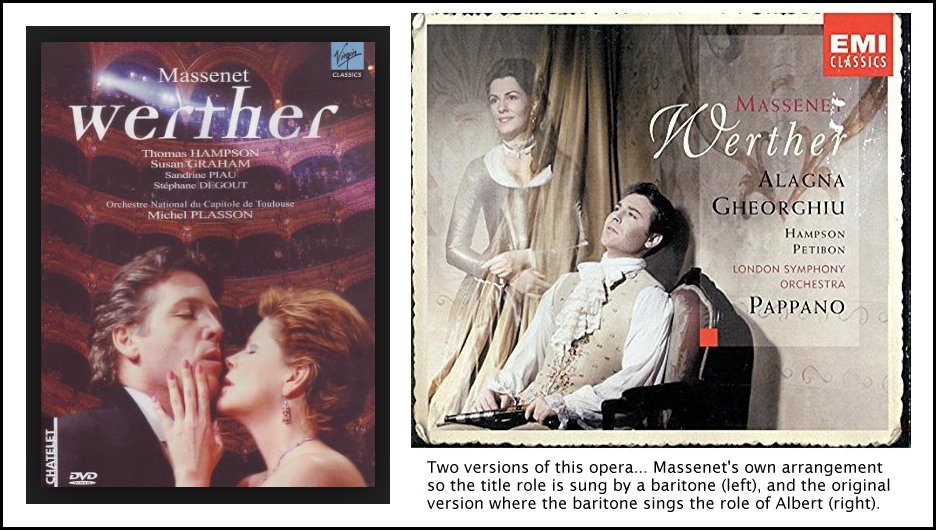
See my Interviews with Susan
Graham, and Antonio
Pappano.
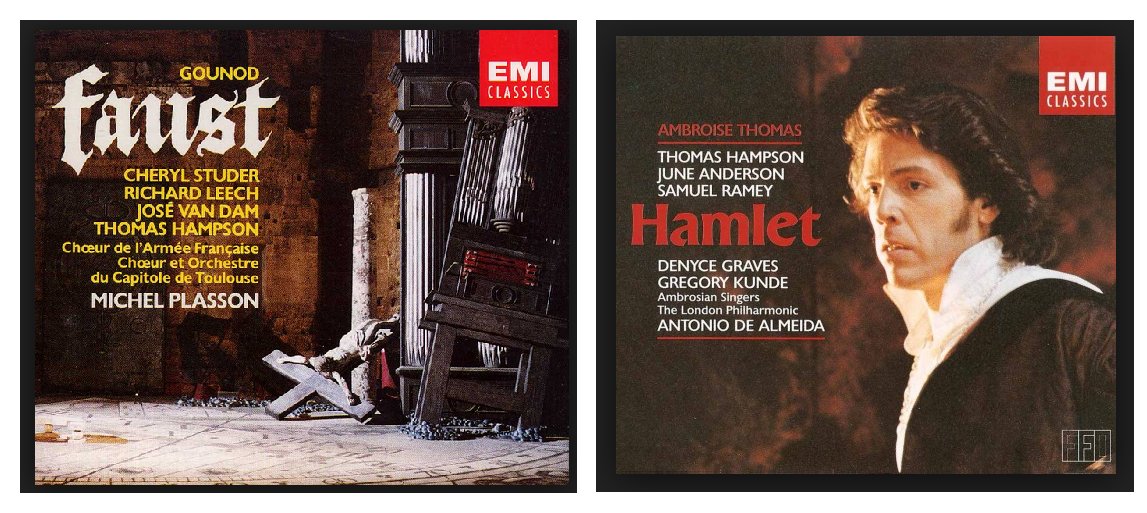
See my Interview with June Anderson.
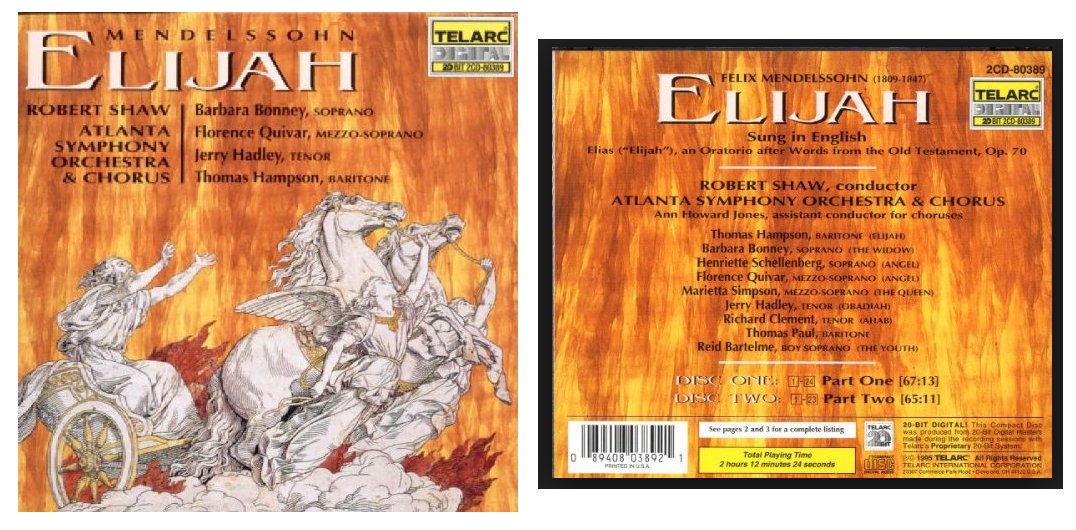
See my Interviews with Barbara
Bonney, and Robert Shaw.
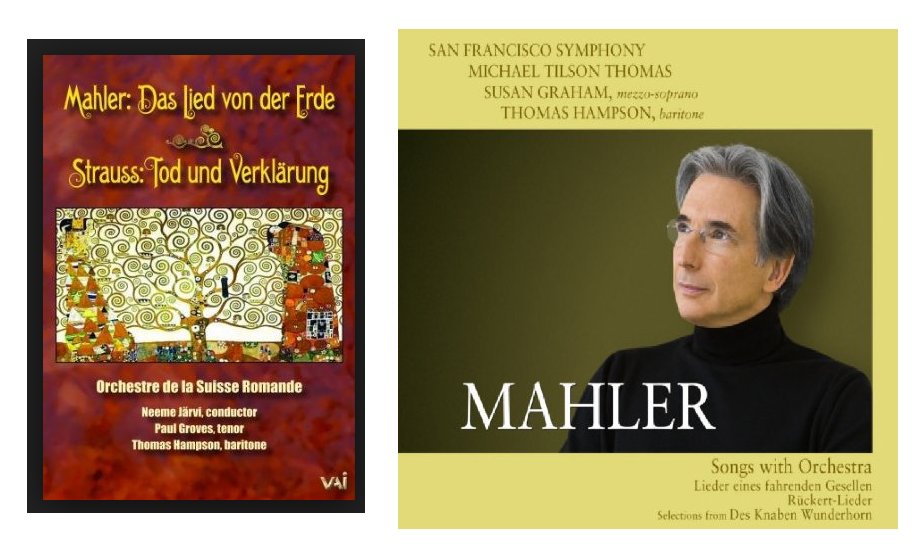
See my Interivews with Neeme
Jarvi, Paul Groves,
and Michael Tilson Thomas.
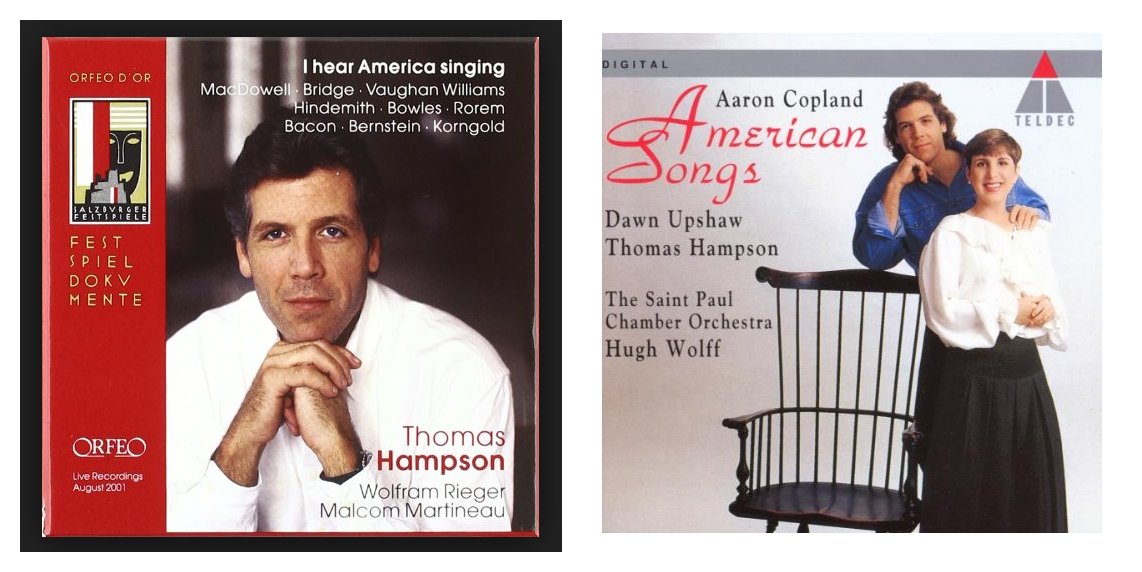
See my Interviews with Paul Bowles, Ned Rorem, Ernst Bacon, Dawn Upshaw, and Hugh Wolff.
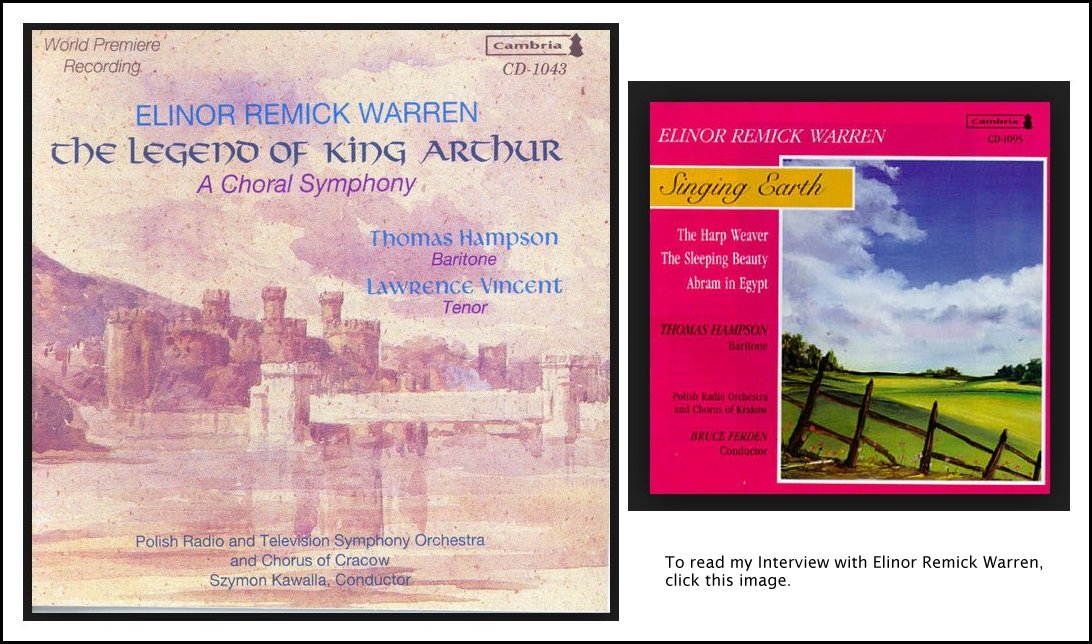
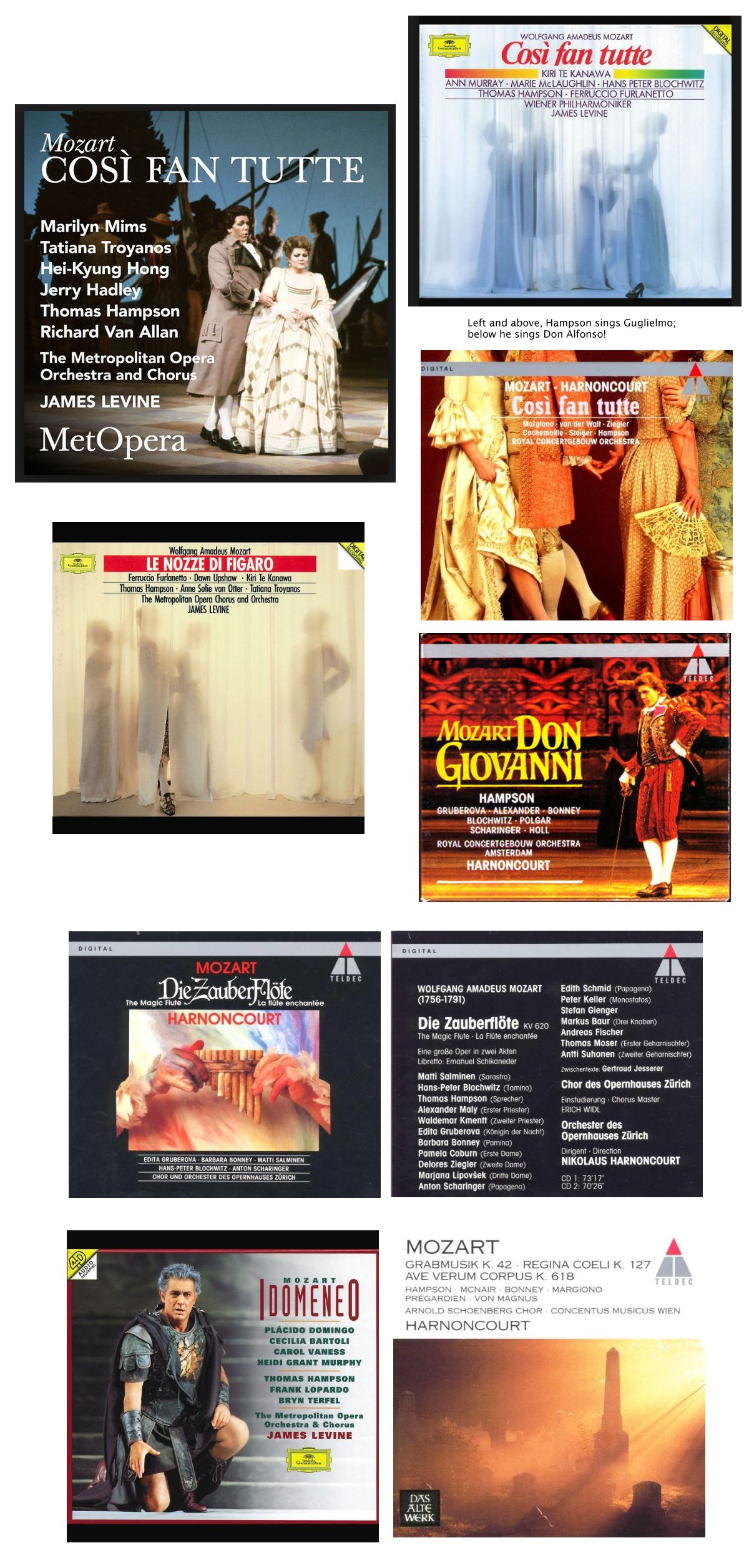 See my Interviews with Tatiana Troyanos, Thomas Moser, and James Levine.
See my Interviews with Tatiana Troyanos, Thomas Moser, and James Levine.
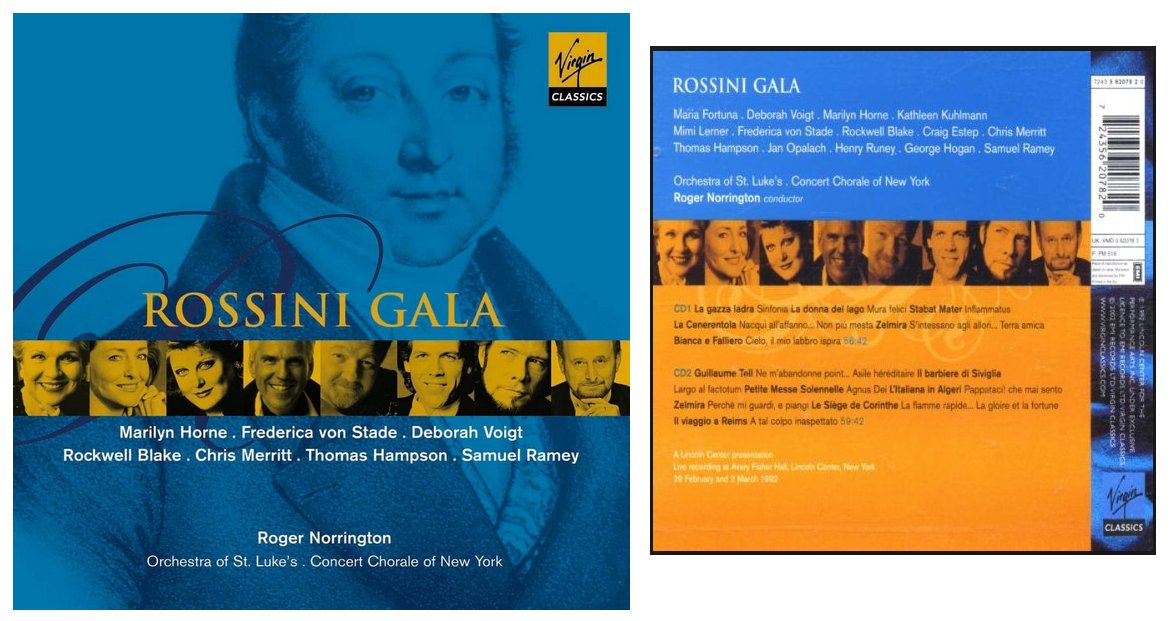
See my Interviews with Marilyn
Horne, Kathleen Kuhlmann,
and Rockwell Blake.
|
© 1992 Bruce Duffie
This conversation was recorded at Orchestra Hall in Chicago on September
14, 1992. Portions were broadcast on WNIB a week later, and again in
1992, 1994, 1995 and 2000. A copy of the unedited audio was placed
in the Archive of Contemporary Music
at Northwestern University.
This transcription was made in 2016, and posted on this website at that time.
To see a full list (with links) of interviews which have been transcribed
and posted on this website, click here.
Award -
winning broadcaster Bruce Duffie was with WNIB, Classical 97 in Chicago
from 1975 until its final moment as a classical station in February of 2001.
His interviews have also appeared in various magazines and journals since
1980, and he now continues his broadcast series on WNUR-FM, as well
as on Contemporary Classical Internet Radio.
You are invited to visit his website
for more information about his work, including selected transcripts of other
interviews, plus a full list of his guests. He would also like to call
your attention to the photos and information about his grandfather,
who was a pioneer in the automotive field more than a century ago.
You may also send him E-Mail with
comments, questions and suggestions.
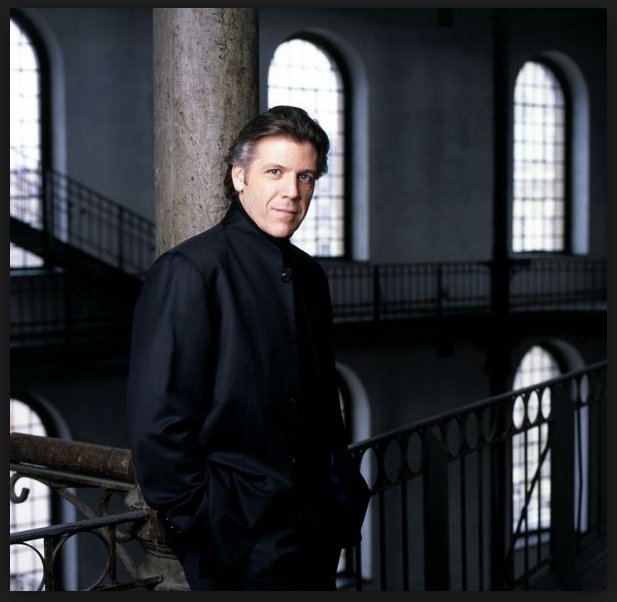

 This conversation took place in Chicago in September of 1992, when he
was in town to open the season of the Chicago Symphony with performances
and recording of the Deutsches Requiem
of Brahms. He was already on his way to becoming an artist of the first
rank, but so many triumphs still lay ahead. Now, as this is being posted
to my website in 2016, we know the full extent of his achievements, and can
still look forward to still more as his career moves along.
This conversation took place in Chicago in September of 1992, when he
was in town to open the season of the Chicago Symphony with performances
and recording of the Deutsches Requiem
of Brahms. He was already on his way to becoming an artist of the first
rank, but so many triumphs still lay ahead. Now, as this is being posted
to my website in 2016, we know the full extent of his achievements, and can
still look forward to still more as his career moves along. TH:
Probably more production to production, although each performance has its
own life. I think it should, anyway. It’s not just a matter of
learning the format for this set of performances. I would like to believe
that it is always the struggle, or the passion, a liberation to spontaneity,
maybe. I hate the idea of doing something in music in terms of manipulating
it, or thinking I’m going to do this piece this way, getting my hands on
it, rolling my sleeves up on it. There is a place in the preparation
of the work that’s like that in the detailed sensitivity with which an artist
has to look at music. I believe in that, and in fact I love that process,
but it seems to me in the re-giving, in the — I don’t particularly like the
word ‘performance’ but there’s
no other word — it seems to me that you have to get rid of ideas of ‘doing’
and ‘making’, and it has to be
more a point of being and existing. That’s essentially what a composer
was trying to do. He wasn’t trying to make a musical piece as much
as he was trying to create a synthesis of different thoughts and ideas in
a musical moment, which then could re-live and re-live and re-live.
TH:
Probably more production to production, although each performance has its
own life. I think it should, anyway. It’s not just a matter of
learning the format for this set of performances. I would like to believe
that it is always the struggle, or the passion, a liberation to spontaneity,
maybe. I hate the idea of doing something in music in terms of manipulating
it, or thinking I’m going to do this piece this way, getting my hands on
it, rolling my sleeves up on it. There is a place in the preparation
of the work that’s like that in the detailed sensitivity with which an artist
has to look at music. I believe in that, and in fact I love that process,
but it seems to me in the re-giving, in the — I don’t particularly like the
word ‘performance’ but there’s
no other word — it seems to me that you have to get rid of ideas of ‘doing’
and ‘making’, and it has to be
more a point of being and existing. That’s essentially what a composer
was trying to do. He wasn’t trying to make a musical piece as much
as he was trying to create a synthesis of different thoughts and ideas in
a musical moment, which then could re-live and re-live and re-live. BD:
That’s the word — ‘consumption’!
BD:
That’s the word — ‘consumption’!
 BD: Despite all of that, is singing fun?
BD: Despite all of that, is singing fun?









